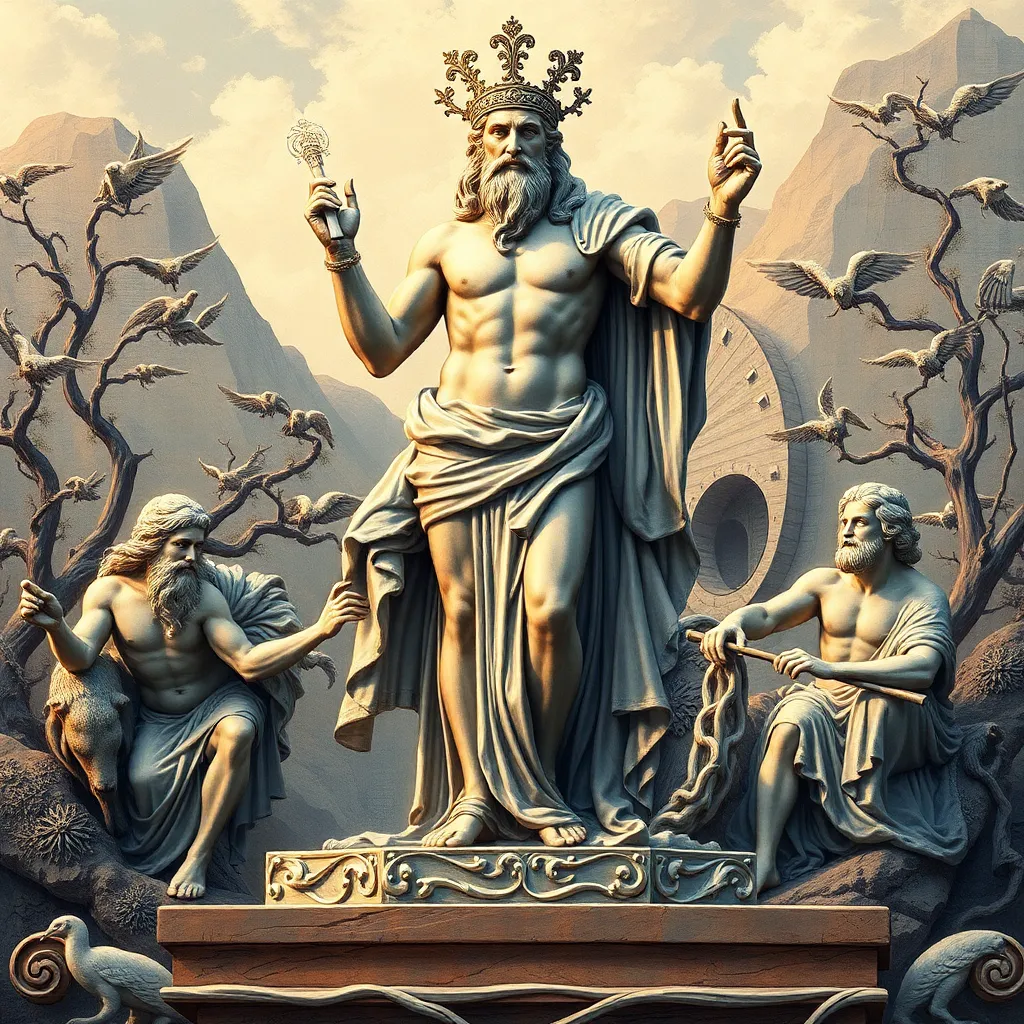The Legacy of Dionysus in Western Philosophy
I. Introduction
Dionysus, the ancient Greek god of wine, fertility, and ecstasy, has long served as a powerful cultural and philosophical symbol. His dual nature embodies the balance between chaos and order, pleasure and restraint. Exploring the influence of Dionysus on Western thought reveals a complex interplay between myth and philosophy, highlighting how ancient beliefs continue to shape contemporary ideas.
Understanding the legacy of Dionysus is essential, as it not only informs our grasp of ancient Greek culture but also illustrates the god’s lasting impact on philosophy throughout the ages. This article explores the historical context of Dionysus, his role in philosophical development, and his relevance today.
II. Historical Context of Dionysus in Ancient Greece
A. Origins of Dionysian worship and myth
The worship of Dionysus dates back to the Mycenaean period, with evidence suggesting rituals involving ecstatic dancing and wine. Initially, he was celebrated as a fertility god associated with agricultural cycles. Over time, his persona evolved to encompass the liberating aspects of intoxication and the ecstatic experience of life.
B. The role of Dionysus in Greek society and religion
Dionysus played a pivotal role in Greek religion, serving as a symbol of the natural and instinctual side of humanity. Festivals such as the Dionysia celebrated his influence through drama, music, and communal revelry. These festivals not only honored the god but also served as a means of social cohesion and artistic expression.
III. Dionysus and the Birth of Western Philosophy
A. The intersection of Dionysian themes with early philosophical thought
The advent of Western philosophy coincided with the cultural milieu shaped by Dionysian worship. Philosophers began to grapple with concepts of existence, reality, and the human condition, often drawing on the dichotomy between order (Apollo) and chaos (Dionysus).
B. Influence on pre-Socratic philosophers
- Heraclitus: His ideas of constant change and the unity of opposites resonate with Dionysian themes of flux and transformation.
- Pythagoras: His emphasis on harmony and mathematical order contrasted with the chaotic nature of Dionysus, showcasing the philosophical struggle between these forces.
IV. Nietzsche and the Dionysian Dichotomy
A. Overview of Friedrich Nietzsche’s interpretation of Dionysus
Friedrich Nietzsche, a pivotal figure in modern philosophy, deeply engaged with the character of Dionysus. He viewed the god as a representation of life’s primal forces and a counterbalance to rationality. For Nietzsche, embracing Dionysian values was essential for achieving a fuller existence.
B. The concept of the Apollonian vs. the Dionysian in “The Birth of Tragedy”
In “The Birth of Tragedy,” Nietzsche introduces the dichotomy between the Apollonian (order, reason, beauty) and the Dionysian (chaos, passion, ecstasy). He posits that true art and life emerge from the tension between these opposing forces. This framework has influenced subsequent thinkers and artists in their explorations of existence and creativity.
V. Dionysus in Modern Existential Thought
A. Exploration of Dionysian themes in existential philosophy
Dionysian themes resound throughout existential philosophy, where the emphasis on individual experience and the absurd mirrors the chaotic nature of the god. Existentialists grapple with the meaning of life in a world devoid of inherent structure, much like the chaotic revelry associated with Dionysus.
B. Influence on thinkers like Kierkegaard and Camus
- Søren Kierkegaard: His focus on subjective experience and the “leap of faith” reflects a Dionysian embrace of passion and the irrational.
- Albert Camus: His concept of the absurd parallels Dionysian themes, as he advocates for embracing life’s chaos despite its inherent meaninglessness.
VI. The Role of Dionysus in Postmodern Philosophy
A. Dionysus as a symbol of chaos and creativity
In postmodern philosophy, Dionysus emerges as a potent symbol of chaos and creativity. The rejection of grand narratives and fixed meanings aligns with the fluidity associated with the god. Postmodern thinkers celebrate the fragmentation of truth and the multiplicity of perspectives.
B. Impact on postmodern theorists such as Derrida and Deleuze
- Jacques Derrida: His deconstructionist approach reflects the Dionysian spirit of challenging established structures and embracing ambiguity.
- Gilles Deleuze: He draws on the notion of becoming and difference, aligning with the transformative and chaotic essence of Dionysus.
VII. Contemporary Relevance of Dionysian Philosophy
A. The resurgence of interest in Dionysian themes in modern culture
In contemporary culture, there is a renewed fascination with the Dionysian. Artistic expressions, from music to visual arts, often explore themes of chaos, ecstasy, and liberation. Festivals and gatherings celebrating hedonism and community reflect a longing for the ecstatic experiences that Dionysus embodies.
B. Implications for contemporary philosophical discourse
Dionysian philosophy continues to influence modern philosophical discourse, challenging rigid structures and encouraging a more fluid understanding of reality. The embrace of chaos and creativity invites new paradigms in ethics, politics, and aesthetics, encouraging a more holistic approach to human experience.
VIII. Conclusion
The legacy of Dionysus in Western philosophy is profound and enduring. His embodiment of chaos, creativity, and the primal forces of life resonates through centuries of thought, from ancient Greece to modern existentialism and postmodernism. As contemporary society grapples with complexity and ambiguity, the influence of Dionysian philosophy remains relevant, urging us to embrace the full spectrum of human experience.
In reflecting on Dionysus, we recognize the importance of balance between order and chaos, reason and passion. This enduring legacy prompts us to consider our own engagement with the world, encouraging a deeper exploration of the ecstatic dimensions of life.




